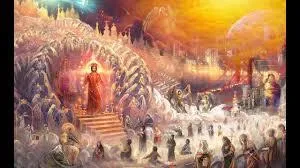I. Introduction to Christian Faith
i. Overview of the statement of faith
ii. What is biblical faith?
iii. The importance of faith in the Christian life
II. The Authority of the Bible
i. The inspiration and inerrancy of Scripture
ii. The role of the Bible in Christian faith and practice
iii. Principles of biblical interpretation
III. The Tri-unity of the Godhead
i. The nature of God as three-in-one
ii. The Father, Son, and Holy Spirit in Scripture
iii. Implications of the Trinity for faith and practice
IV. Creation, Fall, and Redemption
i. The biblical account of creation, fall, and redemption
ii. The sinfulness of humanity and our need for a savior
iii. The work of Christ on the cross and our salvation
V. The Person and Work of Jesus Christ
i. The deity and humanity of Christ
ii. The virgin birth and the life of Christ
iii. The death, burial, and resurrection of Christ
VI. The Gospel of the Grace of God
i. The message of the gospel
ii. The importance of the death, burial, and resurrection
iii. The implications of the gospel for our lives
VII. The Salvation of Sinners
VIII. The Second Coming of Christ
i. Christ's bodily ascension and heavenly enthronement
ii. The second coming and the resurrection of the dead
iii. The implications of the second coming of Christ
X. Pursuing Personal Holiness
i. The importance of personal holiness
ii. The role of discipline and self-control
iii. Sexual immorality and the honor of marriage
i. The nature of salvation
ii. The role of faith in salvation
iii. The assurance of salvation
VII. The Salvation of Sinners
i. The nature of salvation
ii. The role of faith in salvation
iii. The assurance of salvation
IX. Baptism and the Holy Spirit
i. The importance of water baptism by immersion
ii. The baptism of the Holy Spirit and tongues
iii. The gifts of the Spirit and their role in the church
XI. Divine Healing and the Lord's Supper
i. The nature of divine healing
ii. The prayer of faith
iii. The importance of the Lord's Supper for believers
XII. Eternal Life and Eternal Punishment
i. The reality of eternal life for believers
ii. The reality of eternal punishment for unbelievers
iii. The implications of eternal life and eternal punishment for Christian faith and practice




VIII. Christ's Ascension and Second Coming
6. The bodily ascension of Jesus into heaven. (Acts 1:9-11, Luke 24:50-51); His heavenly enthronement. (Hebrews 1:2-3, Ephesians 1:20); His personal appearing at His second coming. (Hebrews 9:28, 1 John 2:28); The Redeemed church shall be changed at this time. (Philippians 3:20-21); and a general resurrection of all the dead in Christ. (1 Thessalonians 4:15-17); all of which shall take place before the wrath of God. (1 Thessalonians 1:10, Romans 5:9).
Living Waters Fellowship FCA Statement of Faith

i. Christ's Bodily Ascension and Heavenly Enthronement
The bodily ascension and heavenly enthronement of Christ are significant events in Christian theology, and they have been affirmed and celebrated throughout church history. The ascension refers to the event when Jesus Christ was lifted up from the earth into heaven, and the enthronement refers to his installation as the exalted Lord and King at the right hand of God the Father. The biblical teaching on these events can be found in several passages throughout the New Testament.
In Acts 1:9-11, it is recorded that after Jesus had spoken to his disciples, he was taken up before their eyes, and a cloud hid him from their sight. Two men dressed in white then appeared and said to the disciples, "Men of Galilee, why do you stand here looking into the sky? This same Jesus, who has been taken from you into heaven, will come back in the same way you have seen him go into heaven." This passage describes the physical nature of Christ's ascension and points to his return in the future.
In Ephesians 1:19-23, Paul speaks of the immeasurable greatness of God's power toward believers, which was demonstrated when God raised Christ from the dead and seated him at his right hand in the heavenly realms. Christ was given the highest position of authority, far above all rule and authority, power and dominion, and every name that is invoked, not only in the present age but also in the one to come. This passage highlights the significance of Christ's enthronement and exaltation to the highest place of honor and power.
In Hebrews 1:3, the writer speaks of Christ as the radiance of God's glory and the exact representation of his being, who sustains all things by his powerful word. After making purification for sins, he sat down at the right hand of the Majesty in heaven. This passage emphasizes the role of Christ's ascension and enthronement in completing his work of redemption and in being exalted to the highest place of honor and authority.
The significance of Christ's bodily ascension and heavenly enthronement is multifaceted.
First, they demonstrate the fulfillment of Christ's mission on earth and the accomplishment of his work of redemption.
Second, they testify to Christ's victory over sin, death, and the powers of darkness, as he is now seated in the highest place of authority and power.
Third, they guarantee the future return of Christ, who will come again to establish his kingdom in fullness. Fourth, they give believers assurance and confidence in their salvation, as they look to Christ, their exalted Lord and Savior.
In light of these biblical teachings, Christians can have confidence and hope in Christ's ascension and enthronement. They can trust in his power and authority, and look forward to his return, when all things will be made right and his kingdom will be fully established.

ii. The Second coming and the Resurrection of the Dead
The Bible teaches that there are future events that will occur, including the Second Coming of Christ and the Resurrection of the Dead. These events are described in various books of the Bible, including the Gospels, Epistles, and Revelation.
The Second Coming of Christ
The Second Coming of Christ refers to the return of Jesus to Earth at the end of the age. This event is described in several passages in the New Testament, including Matthew 24:30-31, Mark 13:26-27, and 1 Thessalonians 4:16-17.
Scriptural Support:
Matthew 24:30-31 - "Then will appear in heaven the sign of the Son of Man, and then all the tribes of the earth will mourn, and they will see the Son of Man coming on the clouds of heaven with power and great glory. And he will send out his angels with a loud trumpet call, and they will gather his elect from the four winds, from one end of heaven to the other."
Mark 13:26-27 - "And then they will see the Son of Man coming in clouds with great power and glory. And then he will send out the angels and gather his elect from the four winds, from the ends of the earth to the ends of heaven."
1 Thessalonians 4:16-17 - "For the Lord himself will descend from heaven with a cry of command, with the voice of an archangel, and with the sound of the trumpet of God. And the dead in Christ will rise first. Then we who are alive, who are left, will be caught up together with them in the clouds to meet the Lord in the air, and so we will always be with the Lord."
The Resurrection of the Dead
The Resurrection of the Dead refers to the belief that all people who have died will be raised from the dead, either to eternal life or eternal judgment. This event is described in several passages in the New Testament, including 1 Corinthians 15:51-52 and Revelation 20:11-15.
Scriptural Support:
1 Corinthians 15:51-52 - "Behold! I tell you a mystery. We shall not all sleep, but we shall all be changed, in a moment, in the twinkling of an eye, at the last trumpet. For the trumpet will sound, and the dead will be raised imperishable, and we shall be changed."
Revelation 20:11-15 - "Then I saw a great white throne and him who was seated on it. From his presence earth and sky fled away, and no place was found for them. And I saw the dead, great and small, standing before the throne, and books were opened. Then another book was opened, which is the book of life. And the dead were judged by what was written in the books, according to what they had done. And the sea gave up the dead who were in it, Death and Hades gave up the dead who were in them, and they were judged, each one of them, according to what they had done. Then Death and Hades were thrown into the lake of fire. This is the second death, the lake of fire."
In conclusion, the Bible teaches that the Second Coming of Christ and the Resurrection of the Dead are future events that will occur. These events are important because they provide hope and assurance to believers that there is a future beyond this life, and that God will ultimately triumph over evil and death.
God's Love: The gospel begins with the truth that God loves us and desires a relationship with us. This love is not based on anything we have done or can do, but is a gift of God's grace.
"For God so loved the world that he gave his one and only Son, that whoever believes in him shall not perish but have eternal life." (John 3:16)
Sin and Separation: The gospel also acknowledges that we are all sinners and separated from God because of our sin. Sin is anything we think, say, or do that is contrary to God's perfect will.
"For all have sinned and fall short of the glory of God." (Romans 3:23)
Redemption: The gospel message reveals how God, in his love, provided a way for us to be reconciled to him through Jesus Christ. Christ's death on the cross paid the penalty for our sins, and his resurrection secured our eternal life.
"But God demonstrates his own love for us in this: While we were still sinners, Christ died for us." (Romans 5:8)
Faith and Repentance: The gospel message calls us to respond to God's love and grace by placing our faith in Jesus Christ as our Lord and Savior, and turning away from our sin.
"If you declare with your mouth, 'Jesus is Lord,' and believe in your heart that God raised him from the dead, you will be saved." (Romans 10:9)
The Impact of the Gospel on the World
The gospel message has had a profound impact on the world. It has transformed individual lives, shaped cultures, and influenced history. Here are just a few ways that the gospel has impacted the world:
Personal Transformation: The gospel has the power to transform individual lives. Countless people throughout history have been radically changed by their encounter with Jesus Christ. The gospel brings hope, forgiveness, and new life to those who receive it.
"Therefore, if anyone is in Christ, the new creation has come: The old has gone, the new is here!" (2 Corinthians 5:17)
Social Reform: The gospel also has a powerful impact on society. Throughout history, the gospel has been a driving force for liberty, social reform and equality. The message of God's love for all people, regardless of race, ethnicity, or social status, has led to movements for civil rights, abolition of slavery, and other important social reforms.
"There is neither Jew nor Gentile, neither slave nor free, nor is there male and female, for you are all one in Christ Jesus." (Galatians 3:28)
Global Missions: Finally, the gospel has a global impact. The message of God's love and grace is for all people, and the gospel has been shared throughout the world through the efforts of missionaries and other Christian workers. As a result, millions of people from every nation and language have come to faith in Jesus Christ.
"Therefore go and make disciples of all nations, baptizing them in the name of the Father and of the Son and of the Holy Spirit." (Matthew 28:19)

iii. The Implications of the Second Coming of Christ
The Second Coming of Christ is a major event that is taught in the Bible. We have already discussed the impact this event can have, and now we'll look at some of the significant implications for the church and the world.
Here are some of the biblical implications of the Second Coming of Christ:
iii. The Implications of the Second Coming of Christ
The Second Coming of Christ is a major event in the Bible that has significant implications for the church and the world. Here are some of the biblical implications of the Second Coming of Christ:
Judgment: The Second Coming of Christ is associated with judgment. Jesus will return to judge the living and the dead (Acts 10:42; 2 Timothy 4:1). Those who have rejected Him will face eternal punishment, while those who have received Him will be rewarded (Matthew 25:31-46; Revelation 20:11-15).
Hope: The Second Coming of Christ brings hope to believers. The Bible teaches that when Jesus returns, He will raise the dead and transform the bodies of believers into glorified bodies like His own (1 Corinthians 15:51-53; Philippians 3:20-21; 1 Thessalonians 4:16-17). Believers can look forward to an eternity in the presence of God (Revelation 21:1-4).
Transformation: The Second Coming of Christ also brings about a transformation of the world. The Bible teaches that the earth will be renewed and restored to its original state before sin entered the world (Isaiah 11:6-9; Romans 8:19-22). There will be no more pain, sorrow, or death (Revelation 21:4).
Warning: The Second Coming of Christ serves as a warning to those who have not yet received Him. The Bible warns that Jesus will come like a thief in the night, catching many people unprepared (1 Thessalonians 5:2-3). The time to receive Him is now, while there is still time.
Urgency: The Second Coming of Christ also brings a sense of urgency to the mission of the church. Believers are called to share the gospel with the world, so that as many people as possible can be saved before Jesus returns (Matthew 24:14; Mark 16:15).
As believers are called to live in light of Christ's second coming, sharing the gospel with the world and eagerly awaiting the return of our Lord and Savior, Jesus Christ.